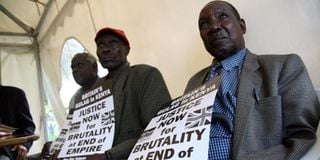Judgement due on Mau Mau UK case

Members of the Mau Mau War Veterans Association in this file photo. The veterans who have sued the United Kingdom (UK) for compensation over alleged torture by the British during the struggle for Kenya’s independence will know their fate October 5, 2012.
What you need to know:
High Court in London is expected to give its judgment Friday.
- Ndiku Mutwiwa Mutua, Paulo Muoka Nzili, and Wambugu wa Nyingi argued they were herded to detention camps for opposing the colonial government.
- Claimants say they survived brutality, including castrations, beatings and sexual assault at the hands of British colonial officials in Kenya.
Mau Mau veterans who have sued the United Kingdom (UK) for compensation over alleged torture by the British during the struggle for Kenya’s independence will know their fate this Friday.
The High Court in London is expected to give its judgment on the Kenyan Colonial torture claims in a case that has dragged for more than a year but which could open up more legal suits against the British, should the Court agree with the claimants.
Survivors of the infamous detention camps operated by the colonialists in the 1950s and 60s, gave their evidence in the case heard in July this year.
In the argument brought to the court last year, Ndiku Mutwiwa Mutua, Paulo Muoka Nzili, and Wambugu wa Nyingi argued that they, with others, were herded to detention camps for opposing the colonial government.
Time barred
The claimants said they represent a wider community of hundreds of elderly Kenyans who survived the brutality, including castrations, beatings and sexual assault at the hands of British colonial officials in Kenya.
The British Government had initially argued that their claims were time-barred and that since it had left Kenya, that all liabilities were transferred to the Kenyan Government after independence in 1963.
But Justice Richard McCombe ruled that the British had “knowledge” of the tortures and did nothing to stop them.
“There is ample evidence even in the few papers that I have seen suggesting that there may have been systematic torture of detainees during the Emergency.
“The materials evidencing the continuing abuses in the detention camps in subsequent years are substantial,” he ruled.
In July, Britain admitted for the first time that Mau Mau were tortured, after hearing the testimonies of the three elderly Kenyans.
Join cause
Paulo Nzili, 83, told the court that he was working on a settler farm when he was abducted by Mau Mau fighters in 1957 and forced to join their cause.
Then the British caught up with him in Nairobi’s Embakasi where he was put in a concentration camp that he claimed was under a Mr Dunman. Four days later, the old man claimed, he was castrated.
Although Wambugu wa Nyingi said he dodged the castrators, he narrated to the Court how he was imprisoned for about a decade where he was regularly beaten at Hola Camp, a place infamous for the death of a dozen detainees from beatings in 1959.
During the hearing, UK scholar David Anderson and author of Histories of the Hanged, a book on Kenyan colonial detention camps also gave evidence from the more than 17,000 files, initially hidden by the British Government but which he claimed to have ‘discovered’.
On Wednesday, Martyn Day the lawyer representing the Kenyans said the acceptance of this brutality by the British should be followed with a public apology.
"The British Government has acknowledged that these Kenyans were tortured but they refuse to apologise or provide any form of redress,” he said in a statement.
"This extraordinary state of affairs has been condemned by leading figures from around the world and we expect the Judge to reject the British Government’s stance.”
The case has been supported by Kenya Human Rights Commission, which hired the lawyers.




